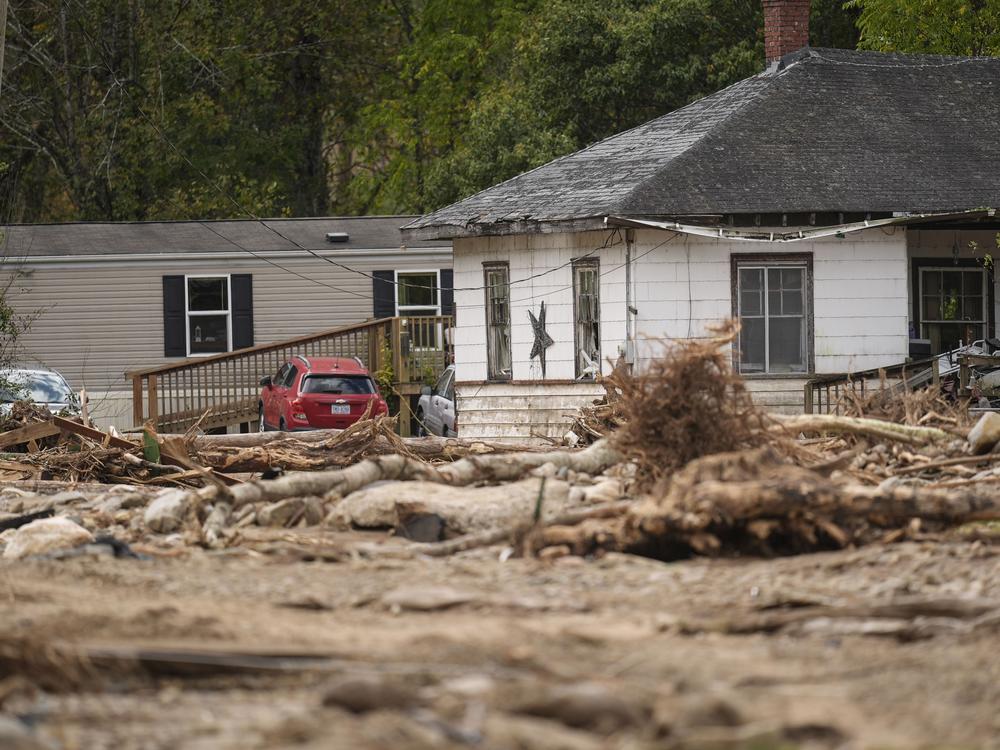Section Branding
Header Content
North Carolina government calculates Hurricane Helene damages, needs at least $53B
Primary Content
RALEIGH, N.C. — The catastrophic flooding and destruction caused by Hurricane Helene in western North Carolina likely caused at least a record $53 billion in damages and recovery needs, Gov. Roy Cooper's administration said Wednesday.
The state budget office generated the preliminary figure for direct or indirect damages and potential investments to prevent similar destruction in future storms.
Cooper told reporters the state's previous record for storm damage was $17 billion from Hurricane Florence, which struck eastern North Carolina in 2018.
"It is no exaggeration to describe Helene as the deadliest and most damaging storm ever to hit North Carolina," Cooper said while unveiling his request to the General Assembly for $3.9 billion to help pay for repairs and revitalization. He called it a "down payment on western North Carolina's future."
North Carolina state officials have reported 96 deaths from Helene, which brought historic levels of rain and flooding to the mountains in late September.
The storm and its aftermath caused 1,400 landslides and damaged over 160 water and sewer systems, at least 6,000 miles (9,650 kilometers) of roads, more than 1,000 bridges and culverts and an estimated 126,000 homes, the budget office said. Some 220,000 households are expected to apply for federal assistance.
"This jaw-dropping damage figure reminds us that we are very much on the front end of this recovery effort," the Democratic governor said.
The report with Cooper's spending request was released the day before the Republican-controlled legislature planned to meet for a one-day session to advance additional Helene recovery legislation.
Lawmakers unanimously approved two weeks ago a $273 million package that also included language to provide flexibility to state agencies, displaced residents and officials running elections in 25 western counties. Thirty-nine of the state's 100 counties are within the federally declared disaster area.
State government coffers include several billon dollars that can be accessed for future recovery spending. Almost $4.5 billion is in the state's savings reserve alone.
Legislative leaders had not disclosed as of late Wednesday afternoon specifics about what they would attempt to pass Thursday. Lawmakers were still reviewing Cooper's request that they received Tuesday, according to Lauren Horsch, a spokesperson for Senate leader Phil Berger. Any legislation is unlikely to be the full package presented by Cooper and State Budget Director Kristin Walker. After Thursday, legislators are expected to return to Raleigh on Nov. 19.
The damage report projects $48.8 billion in direct or indirect damages, along with $4.8 billion of anticipated mitigation expenses. The budget office estimates the federal government will cover $13.6 billion, with private and other sources covering $6.3 billion.
Most of the losses won't ever be recovered, Walker said.
The private-source share of expenses likely will be relatively low because so few homeowners and farmers in the disaster areas had flood or crop insurance. Close to 93% of homes with flood damage verified by the Federal Emergency Management Agency lacked flood insurance, the report said.
Cooper's request includes $475 million for a two-phase recovery program for businesses in the hardest-hit areas, with grants from $1,500 to $50,000 in the first phase and up to $75,000 in the second phase.
Other highlights include $289 million in matching funds to access federal money to repair utilities and debris removal; $225 million for grants to farmers for uninsured losses; and $100 million for public school and community college capital needs.
Cooper also wants $325 million to help homeowners and renters with rebuilding and minor repairs immediately while a larger program dependent on federal funds is implemented. It took nearly two years for Washington to send community development block grant funding for home repairs after Florence and Hurricane Matthew in 2016, the report said.
Wednesday's request also seeks $175 million to cover remaining Matthew and Florence home repairs being made through the block grant program. Cooper's administration attributes the shortfall to rising construction costs, labor shortages, the COVID-19 pandemic and a congressional appropriation that was roughly half of what the state requested.
The fiscal gap prompted Berger and another leading Senate Republican to put out a news release Wednesday criticizing the $175 million request and its timing, calling them yet another sign of poor management by the state Office of Recovery and Resiliency. The senators said an oversight committee would investigate the matter next month.

